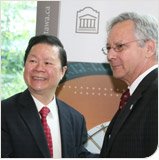



by Philippe Marchand
.
.
To understand what some student journalists are now calling "the Rancourt saga", we need to remember where the whole debate started: the creation of the controversial "Science, activism and society" course (SCI1101) in 2006. The course was given once in Fall 2006, with prof. Denis Rancourt as a facilitator and coordinator. It was an elective course graded S/NS (satisfactory/non-satisfactory), not counting towards the specific requirements of any university program or towards the students' grade point average. Over 100 students were registered and some guest lectures attracted more than 400 participants.
.
.
Having attended the various 2006 committee meetings dealing with the approval of SCI1101/1501, I have witnessed many objections to both the proposed content and pedagogy of the class. Many professors opposed the idea that students could decide the content of the class. Others pointed out that an "A+" student might be disadvantaged by an "S" grade on his/her report. Some used a slippery slope argument: "What would happen if all classes were like this?" On June 11, 2007, the University of Ottawa Senate ruled that only the Senate - rather than a professor, department or Faculty - could allow a class to be graded S/NS.
.
.
I am now a first-year doctoral student at the University of California - Berkeley. As I learned more about my new campus, I found a completely different approach, on the issues discussed above, than the one prevailing at the University of Ottawa.
.
.
In the early 1980s, Berkeley introduced the DeCal system ("De" stands for Democratic Education). DeCal courses are facilitated by undergraduate and graduate students. They allow students to go outside the bounds of traditional courses and offer more "practical" or "current" content. Of a total undergraduate population of 25 000, over 4000 students are enrolled in around 150 DeCal classes every semester. Current DeCals include: "Batman as American Mythology", "The Life and Legacy of Tupac Amaru Shakur", "Student Power: Organizing and Activism", and a journalism class offered by editors of the student newspaper.
.
.
Any student can start a DeCal course. All they need is a professor to sponsor the course and the authorization of this professor's department. DeCal courses are worth 1 to 3 credits and undergraduate students are allowed to take up to 16 credits of DeCal as part of their electives. All the DeCal courses are graded pass / not pass (P/NP), which is exactly equivalent to S/NS at U of O. At Berkeley, undergraduate students have the option to take up to one-third of their total units as P/NP grades.
.
.
After decades under that system, the catastrophe imagined by some University of Ottawa administrators did not happen. Berkeley has maintained a high reputation among public universities in North America and internationally. I am not arguing that any university should copy the DeCal model, but rather this shows that there is no contradiction between providing high quality education and giving flexibility for students to take a more active role in their education and go outside the traditional classroom box.
.
.
U of O alumni in Physics
Graduate student in Environmental Science, Policy and Management, UC Berkeley
.
Editor’s note: In particular, Professor Tito Scaiano (Chemistry), in a letter to The Ottawa Citizen, mused that society would fall apart if we allowed the S/NS grading system. By contrast, labour law Arbitrator Michel G. Picher ruled that the choice of the S/NS grading system was within the purview of a professor’s academic freedom. The new U of O Senate rule on S/NS was passed in secret (under the pretext of clarifying an old text) while a policy grievance on the matter was being arbitrated. The professor’s union complained in writing about the underhanded passing of the new rule.
.
.
Editor’s note: In particular, Professor Tito Scaiano (Chemistry), in a letter to The Ottawa Citizen, mused that society would fall apart if we allowed the S/NS grading system. By contrast, labour law Arbitrator Michel G. Picher ruled that the choice of the S/NS grading system was within the purview of a professor’s academic freedom. The new U of O Senate rule on S/NS was passed in secret (under the pretext of clarifying an old text) while a policy grievance on the matter was being arbitrated. The professor’s union complained in writing about the underhanded passing of the new rule.
.
[URL links were inserted by UofOWatch.]
[Photo credit: Pawel Dwulit; April 18, 2006, Faculty Council scenes and President’s closed door reception aftermath.]




7 comments:
Philippe,
What is the policy of community members sitting in on lectures in the DeCal program?
And...
...Where was the Berkeley security when all this democracy was going on? Maybe it is the UofO Admin/Security who needs to be offering one of these courses at Berkeley on how to "stifle student engagement".
Philippe, haven't you learned that U of O is NOT Berkely??? U of O has Vision 1020.
It's alumnUS, moron.
AlumnI is the plural form
How long have you worked at a University?
For chrissake.
Are you sure you're not at Berklee?
it's "for Christ's sake"...
No. It's not, actually.
Lol, mature guys... :P
Mr. Marchand, thank you for posting an article that is somewhat informative while giving a fair opininion and without resorting to agression. I wish more of this issue was discussed in that way. But, that's just my opinion. And I hope nobody will browbeat me for silly spelling mistakes.
Post a Comment